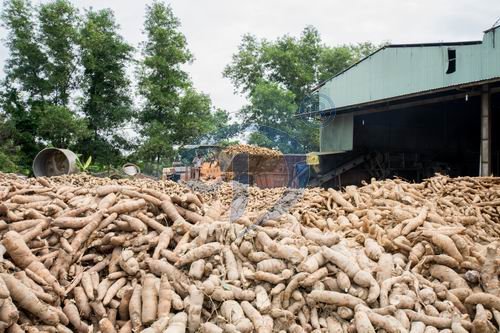Growing demand sparks cassava to extract starch

Processing cassava into cassava starch
Around 200 million poor farmers in developing countries around the world rely on root and tuber crops for food security and income. These crops – such as cassava, potatoes, sweet potatoes and yams – are excellent sources of energy, and some are rich in vitamins and minerals.Cassava is the most important of these for a number of reasons.
Farmers cultivate cassava on their small plots of land because they do not have to spend a lot of time looking after it. It can grow in marginal upland conditions and tolerates stress, drought, heat and poor soil, which is especially important as farmers adapt to the impacts of climate change. Farmers can grow cassava alongside other crops to spread their risk, and because the market is diverse, it can bring improved incomes to put food on the table when other crops might not survive.
In today's fast-changing world, rapid economic growth must be balanced with environmental sustainability. Add to this the challenge of climate change – more extreme, more variable weather events – and population increases. Our challenge is to produce more food with fewer resources. Roots and tubers like cassava are relatively well-placed to deal with these challenges – if they are managed properly.
In West Africa, there are signs of growing interest in using locally-made cassava starch as an import substitute. Cassava starch start-ups have recently been established in Uganda, Tanzania, and Madagascar, while in Malawi industries have shown interest in buying local cassava starch for use in paper, cardboard, sweets and food processing. Meanwhile, the region’s leading cassava producer, Nigeria, has recently announced an ambitious programme aimed at producing ethanol biofuel from cassava.
“Market opportunities for native cassava starch,” says NeBambi Lutaladio, “exist to some extent in all tropical countries with a degree of industrialization. However, potential entrants to this market will only succeed if they have sufficient capital to back the venture, and can deliver reliable supplies of starch that meet the users’ specifications at a competitive price.”
With world cassava root production now standing at some 200 million tonnes a year, FAO says many developing countries could strengthen their rural economies – and boost cassava farmers’ incomes – by converting more of that relatively low-cost raw material into high-value starches. “Cassava makes a really excellent starch,” says Danilo Mejía, an agricultural engineer with FAO’s Agricultural Support Systems Division, who is coordinating the preparation of a new manual on cassava starch extraction for developing countries. “Compared to starches derived from most other plants, it has greater clarity and viscosity, and it’s very stable in acidic food products. It also has excellent properties for use in non-food products, such as pharmaceuticals and thermobioplastics.”
Our company can supply the complete cassava starch processing machine . While semi-mechanized processing can yield up to 10 tonnes a day, the modern fully mechanized cassava starch extraction plants, daily output is as high as 200 tonnes.
PREV:Quality control of cassava products
NEXT:New technology make cassava processing more efficient and sustainable
Leave a message
contact us
- WhatsApp:
+8613526615783
- Email:
sales@doinggroup.com
- Tel:
0086 135 2661 5783
- Phone:
0086 371 5677 1822
- Skype:
elina881130
- Address:
No.133 Yaozhai Road, Jinshui District, Zhengzhou City, Henan Province, China
News
-
 Cassava chips processing machine shipped to Nigeria
Cassava chips processing machine shipped to Nigeria
-
 Factors affecting the price of cassava processing equipment
Factors affecting the price of cassava processing equipment
-
 How to starct cassava production and processing business in Nigeria ?
How to starct cassava production and processing business in Nigeria ?
-
 DOING cassava starch production line successfully delivered to Nigeria
DOING cassava starch production line successfully delivered to Nigeria
-
 Cassava peeling machine shipped to Nigeria
Cassava peeling machine shipped to Nigeria
-
 What are the advantages of automatic starch production line ?
What are the advantages of automatic starch production line ?
-
 Garri processing machines and their prices
Garri processing machines and their prices
-
 New cassava slicer machine are ready to ship to Nigeria
New cassava slicer machine are ready to ship to Nigeria
-
 How profitable is garri processing business in nigeria ?
How profitable is garri processing business in nigeria ?
-
 Factors affecting the price of garri processing machine
Factors affecting the price of garri processing machine
Products
FAQ
-
 What is high quality cassava flour, how to produce high quality cassava flour ?
What is high quality cassava flour, how to produce high quality cassava flour ?
-
 How to process cassava into cassava chips ?
How to process cassava into cassava chips ?
-
 Cassava starch manufacturing process
Cassava starch manufacturing process
-
 How to maintain cassava starch processing equipment ?
How to maintain cassava starch processing equipment ?
-
 How to extract cassava starch ?
How to extract cassava starch ?
-
 How to make cassasva starch?
How to make cassasva starch?
-
 Water, electricity, steam and land deploy in starch processing plant
Water, electricity, steam and land deploy in starch processing plant
-
 How profitable is cassava starch made?
How profitable is cassava starch made?
Leave a message

Tel/Whatsapp:
+8613526615783



